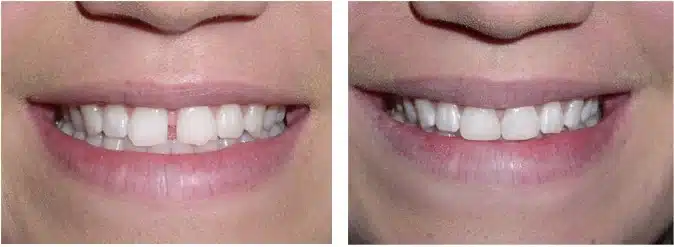Call: (630) 812-7929
How Long Does Dental Bonding Last? Everything You Need To Know


Are you considering dental bonding to fix a chipped or discolored tooth? Or have you already had the procedure done and are wondering how long it will last? Dental bonding is a popular cosmetic dentistry treatment that can improve the appearance of your smile. However, like any dental procedure, it’s important to understand its longevity. In this blog post, we’ll explore everything you need to know about how long dental bonding lasts and what factors can affect its durability. So sit back, relax, and let’s dive into the world of dental bonding!
What Is Dental Bonding?
Dental bonding is a cosmetic dental procedure that involves the use of tooth-colored resin material to improve the appearance and function of teeth. It’s an affordable, quick, and non-invasive solution for minor dental imperfections such as chipped or cracked teeth, gaps between teeth, and discolorations.
The process of dental bonding starts with cleaning and preparing the surface of the damaged tooth. The dentist then applies a special adhesive to ensure that the resin material bonds well to the tooth. Afterward, they will shape and mold the resin to match your natural teeth’ color and shape.
Once everything is in place, a special curing light is used to harden and set the resin material into place. Dental bonding usually takes about 30-60 minutes per tooth depending on how many are being treated.
One great thing about dental bonding is that it requires no special care other than practicing good oral hygiene habits like brushing twice daily, flossing regularly, and visiting your dentist every six months for checkups. With proper care, dental bonding can last up to 5-10 years before needing any touch-ups or replacements.
If you have minor dental issues that cause self-consciousness about your smile or discomfort when eating or speaking – consider consulting with a professional dentist who can determine whether this treatment option would be right for you!
How Dental Bonding Works
Dental bonding is a cosmetic procedure that involves the application of tooth-colored resin material to repair teeth imperfections such as chips, cracks, and stains. This treatment can also be used to fill gaps between teeth or improve their shape. The process starts with the dentist etching the surface of the tooth and applying an adhesive substance.
Afterwards, they mold and sculpt the resin onto your tooth before using ultraviolet light to harden it in place. Dental bonding is a quick and painless process that usually takes only one appointment.
The great thing about dental bonding is that it allows for customization according to your unique needs. Your dentist can choose from various shades of composite resin material to match your natural teeth color accurately. Additionally, they can add layers of composite until you achieve your desired result.
While dental bonding isn’t as durable as other cosmetic treatments like veneers or crowns, it does have lasting power when taken care of properly with good oral hygiene practices at home combined with regular cleanings from your dentist.
How To Test For Dental Bonding
If you have recently had dental bonding done, it is important to know how to test for its durability. Luckily, there are a few simple tests that can be done at home or during your regular dental check-ups.
One of the easiest ways to test for dental bonding is by using your own teeth. Gently biting down on something with moderate pressure such as an apple or carrot can help determine if the bond is holding up well. If you experience any pain or discomfort while chewing, it may be a sign that the bond has loosened and needs to be repaired.
Another way to test for dental bonding is by running your tongue over the bonded area and feeling for any rough edges or irregularities. This can indicate that the bond has chipped off or worn away and requires attention from your dentist.
In some cases, X-rays may also be used to ensure that the bond remains intact below the surface of your tooth. Your dentist will typically recommend this type of testing if they suspect any underlying issues that cannot be seen through a visual examination alone.
Keeping an eye out for changes in sensation when eating or examining your bonded teeth regularly can help detect potential problems early on before they require more extensive treatment.
What To Do If You Lose Dental Bonding
If you happen to lose a dental bonding, do not panic. This is a common occurrence that can be fixed by your dentist. The first thing you should do is schedule an appointment with your dentist as soon as possible.
In the meantime, if the lost bonding causes any discomfort or sensitivity, try to avoid hot or cold liquids and foods. You can also use over-the-counter pain medication to manage any discomfort.
Avoid biting down on hard objects on the side of your mouth where the bonding was lost as this may cause further damage. Additionally, make sure to keep up with proper oral hygiene practices such as brushing and flossing regularly.
During your appointment with the dentist, they will assess the extent of damage and recommend either repairing or replacing the bonding. In some cases, they may need to remove it completely and replace it with a new one.
Losing dental bonding is nothing to worry about as it can easily be fixed by visiting your dentist in a timely manner.
The Bottom Line
In summary, dental bonding is an excellent cosmetic dentistry procedure that can help improve the look of your teeth and restore their function. It is a relatively easy and painless process that involves applying a tooth-colored resin to the surface of your teeth.
While dental bonding may not be as durable as other restorative options like crowns or veneers, it still provides long-lasting results when properly cared for. The lifespan of dental bonding depends on several factors such as oral hygiene habits, diet, and regular visits to the dentist.
If you’re considering getting dental bonding done, make sure you consult with a trusted dentist who has experience in performing this procedure. They will be able to assess whether you are a good candidate for the treatment and provide guidance on how best to care for your bonded teeth.
If you take proper care of your bonded teeth by maintaining good oral hygiene practices and avoiding bad habits like biting hard objects or chewing ice cubes, they should last up to ten years or longer. With its many benefits and minimal drawbacks, dental bonding remains an affordable yet effective way to enhance your smile’s appearance while restoring functionality.





